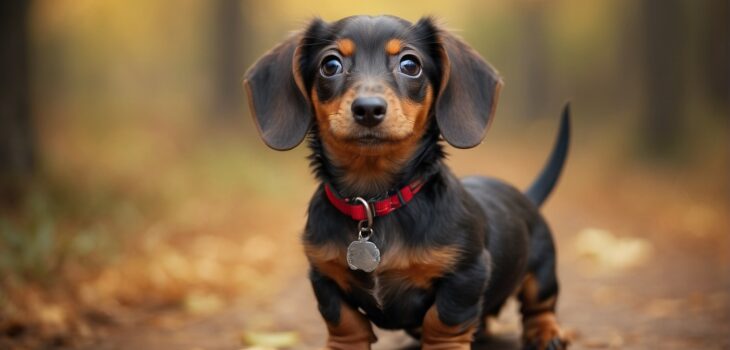Imagine having a furry companion whose cuteness is irresistible, captivating everyone it encounters. Dachshunds, with their unique long bodies and floppy ears, hold an adorable charm that sets them apart from other dog breeds. Their endearing expressions and playful personalities have enchanted countless dog lovers, leaving them wondering: why are dachshunds so cute?
Appearance
Distinctive body shape
One of the most recognizable features of a Dachshund is its distinctive body shape. With their short legs and long bodies, they have a unique look that sets them apart from other dog breeds. This body shape is a result of their purpose as hunting dogs, allowing them to burrow into tunnels and dens to track down prey. It may be unconventional, but it adds to their charm and makes them irresistibly adorable.
Variety of coat colors and patterns
Dachshunds come in a wide range of coat colors and patterns, which further adds to their appeal. From classic solid colors like red, black, and chocolate to dappled, brindle, and piebald patterns, there is a Dachshund to suit every taste. No matter your preference, you are sure to find a Dachshund with a coat that catches your eye and warms your heart.
Expressive eyes and ears
The expressive eyes and ears of a Dachshund are another reason why they are so cute. Their big, soulful eyes seem to speak volumes and can melt even the coldest heart. Combined with their long, floppy ears that seem to have a mind of their own, Dachshunds have a way of capturing your attention and making you fall in love with them instantly.

Personality
Playful and curious nature
Dachshunds have a playful and curious nature that makes them a joy to be around. They love to explore their surroundings and are always up for an adventure. Whether it’s chasing after a toy or investigating a new scent, Dachshunds have a zest for life that is contagious. Their playful antics will keep you entertained and remind you to approach life with a sense of curiosity and enthusiasm.
Loyal and affectionate
Despite their small size, Dachshunds have a heart full of loyalty and affection. They form strong bonds with their owners and will always be by your side, ready to offer comfort and companionship. Whether you’re having a good day or a bad day, your Dachshund will be there, showering you with love and reminding you that you are never alone.
Intelligent and independent
Dachshunds are known for their intelligence and independent nature. While they are eager to please their owners, they also have a stubborn streak that can make training challenging at times. However, with patience and positive reinforcement, Dachshunds can quickly learn new commands and tricks. Their intelligence and independence make them versatile and adaptable companions.
Size and Adaptability
Compact size for indoor living
Dachshunds are an ideal choice for those living in apartments or small spaces. Their compact size means they can comfortably adapt to living indoors without needing a large yard to run around in. As long as they get regular exercise and mental stimulation, they are content to curl up on the couch with their favorite human.

Suitable for apartments and small spaces
Due to their size and adaptability, Dachshunds are well-suited for apartment living. Their small stature allows them to navigate tight spaces with ease, and their low exercise requirements make it feasible to meet their needs even in an urban setting. As long as they receive adequate mental and physical stimulation, Dachshunds can thrive in a small living environment.
Exercise Requirements
Moderate exercise needs
Dachshunds have moderate exercise needs, making them a perfect fit for individuals or families with busy schedules. While they do enjoy short walks to stretch their legs, they do not require extensive amounts of daily exercise. Engaging in playtime activities such as fetch or puzzle toys can help keep them mentally and physically stimulated.
Enjoys short walks and playtime
Dachshunds are happiest when they have an opportunity to stretch their legs and explore their surroundings. Going on short walks or playing in a secure outdoor area not only provides them with exercise but also helps them burn off excess energy. It is important to remember not to overexert them, as their long bodies can be prone to back problems. Regular playtime sessions will keep your Dachshund happy and healthy.
Training
Responsive to positive reinforcement
Dachshunds respond well to positive reinforcement training methods. They thrive on praise, treats, and rewards, which can help motivate them to learn new commands and behaviors. By using positive reinforcement techniques such as clicker training or food rewards, you can effectively train your Dachshund while keeping their spirits high.
Can be stubborn at times
While Dachshunds are intelligent and quick learners, they can also be stubborn at times. This stubbornness can make training more challenging, requiring patience and consistency from their owners. It is important to establish clear boundaries and be firm yet gentle when training your Dachshund. With time and persistence, you can overcome their stubborn tendencies and successfully train them.
Socialization
Gets along with other dogs and pets
Dachshunds are generally friendly and get along well with other dogs and pets, especially when properly socialized from a young age. They enjoy the company of their furry counterparts and can form strong bonds with them. Introducing your Dachshund to different animals gradually and positively can help ensure they become well-rounded and sociable companions.
May be reserved or aloof with strangers
While Dachshunds are loyal and affectionate with their families, they may be reserved or aloof with strangers. It is in their nature to be cautious around unfamiliar faces, as they have a strong protective instinct. Early socialization and exposure to different people can help them become more comfortable and accepting of new acquaintances. With proper training and positive experiences, they can learn to interact with strangers in a polite and friendly manner.
Grooming
Low maintenance coat
Dachshunds have a low maintenance coat that requires minimal grooming. Their short, smooth coats do not tangle easily, reducing the need for excessive brushing. A quick weekly brushing or wiping down with a damp cloth is usually sufficient to keep their coat looking clean and shiny. It’s important to pay attention to their ears and nails, which may require regular cleaning and trimming.
Regular dental care is important
While Dachshunds may have a low maintenance coat, it’s essential to prioritize their dental health. Like many small dog breeds, Dachshunds can be prone to dental issues such as plaque buildup and tooth decay. Regular brushing and dental check-ups are crucial to maintain their oral hygiene and overall health. By incorporating dental care into their routine, you can significantly reduce the risk of dental problems.
Health
Prone to certain genetic health issues
Unfortunately, Dachshunds are susceptible to certain genetic health issues, primarily related to their unique body shape. Their long spines and short legs put them at a higher risk of developing back problems, such as intervertebral disc disease. Additionally, they may be prone to conditions like obesity, dental diseases, and joint issues. Regular vet check-ups, a balanced diet, and providing them with a healthy lifestyle are essential for minimizing these potential health concerns.
Adequate diet and regular vet check-ups
To ensure the overall health and well-being of your Dachshund, it is important to provide them with a well-balanced diet that meets their specific needs. Consult with your veterinarian for proper nutrition guidelines and portion control. Additionally, regular veterinary check-ups are crucial for early detection of any potential health issues. By staying proactive and taking preventive measures, you can help your Dachshund live a long and healthy life.
Longevity
Lifespan of a Dachshund
On average, Dachshunds have a lifespan of 12 to 16 years. With proper care, nutrition, exercise, and regular veterinary check-ups, they can live a full and happy life. However, it’s important to note that individual factors and genetic predispositions can influence an individual Dachshund’s lifespan.
Factors that influence lifespan
Various factors can influence the lifespan of a Dachshund. Genetics, responsible breeding, diet, exercise, healthcare, and overall lifestyle play significant roles in determining their longevity. Regular exercise to maintain a healthy weight, a well-balanced diet, and preventative care can all contribute to maximizing their lifespan. Providing them with a loving and nurturing environment and meeting their physical and emotional needs are also factors that can positively impact their overall health and longevity.
Dachshund Varieties
Standard Dachshunds
Standard Dachshunds are the original size variety of the breed. They typically weigh between 16 to 32 pounds and stand around 8 to 9 inches tall at the shoulder. They have a confident and outgoing personality, making them great family companions. Standard Dachshunds are versatile dogs and are often used in various dog sports and activities.
Miniature Dachshunds
Miniature Dachshunds are a downsized version of the standard breed. They usually weigh between 11 to 16 pounds and stand around 5 to 6 inches tall at the shoulder. Miniature Dachshunds are known for their spunky and lively personalities. They are energetic and thrive on being the center of attention. Despite their small size, they have a big heart and a playful spirit.
Wire-haired Dachshunds
Wire-haired Dachshunds have a unique coat that sets them apart from their smooth and long-haired counterparts. Their wiry and dense coat requires regular grooming to maintain its texture and prevent matting. Wire-haired Dachshunds have a spirited personality, often described as lively and outgoing. They are known for their tenacity, making them excellent hunters and family pets alike.
In conclusion, Dachshunds possess an undeniable charm that stems from their distinctive appearance and lovable personality. Their compact size and adaptability make them well-suited for apartment living, while their moderate exercise needs ensure that they stay healthy and happy. Although they can be stubborn at times, Dachshunds respond well to positive reinforcement training and enjoy socializing with other dogs and pets. With proper grooming and regular vet check-ups, they can lead a long and fulfilling life. So, if you’re looking for a companion who will bring joy, loyalty, and endless affection into your life, look no further than the adorable charm of a Dachshund.




